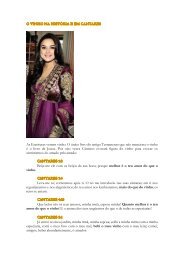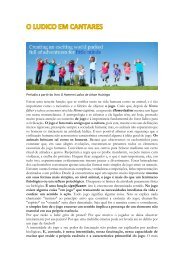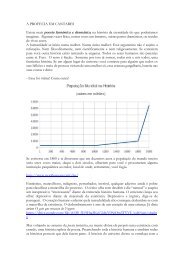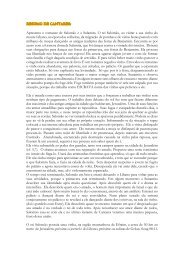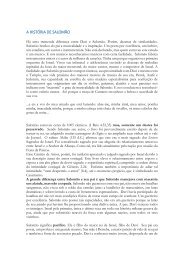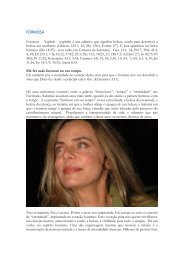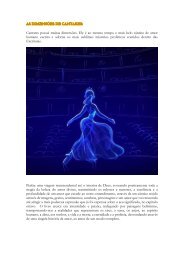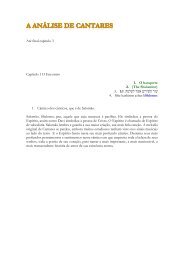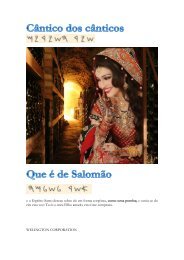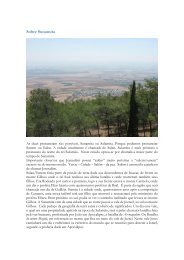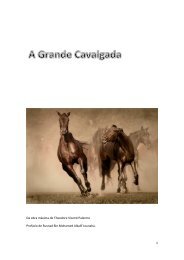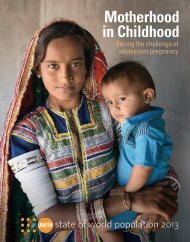- Page 1 and 2:
e o Espírito Santo desceu sobre el
- Page 3:
Apresenta 3
- Page 6 and 7:
em Cantares. Essa é uma das ferram
- Page 8 and 9:
Cantares usará a figura do amor hu
- Page 10 and 11:
singular o descompasso de muitos co
- Page 12 and 13:
A Sublimidade De Cantares As Escrit
- Page 14 and 15:
FORMOSA Formosa - Yapheh - (yapheh)
- Page 16 and 17:
A HISTÓRIA DE SALOMÃO Há uma tre
- Page 18 and 19:
Um pouco antes da morte de seu pai,
- Page 20 and 21:
Sunem em 1914 A Sunamita neste mome
- Page 22 and 23:
Isso coloca o tempo da Autoria de C
- Page 24 and 25:
Cantares possui muitas dimensões.
- Page 26 and 27:
o arrogante ao humilde, o déspota
- Page 29 and 30:
As Escrituras vertem vinho. O únic
- Page 31 and 32:
derramado, ao sacrifício, em muita
- Page 33 and 34:
Os egípcios foram os primeiros a s
- Page 35 and 36:
A propósito, o código de Hammurab
- Page 37 and 38:
Hypocraz VINHO DE ESPECIARIAS (hipo
- Page 39 and 40:
CHORO Dá-se nos últimos dias do I
- Page 41 and 42:
PERIODO DE ANTERIOR À FLORAÇÃO D
- Page 43 and 44:
Podemos definir o início da matura
- Page 45 and 46:
Detalhe da poda seca Os galhos mais
- Page 47 and 48:
2. Doenças: 1. Provocadas por Fung
- Page 49 and 50:
Doença - mildio 49
- Page 51 and 52:
Antigo lagar de Vinho em Cafarnaum
- Page 53 and 54:
Em todo o Antigo Testamento bíblic
- Page 55 and 56:
Quarenta ânforas encontradas na pa
- Page 57 and 58:
odres velhos, porque senão se romp
- Page 59 and 60:
A: Mas também estes cambaleiam por
- Page 61 and 62:
Sidon exportava seu vinho para o Eg
- Page 63 and 64:
Mapa dos vinhas atuais em Israel 63
- Page 65 and 66:
Preludio a partir do livro O Homem
- Page 67 and 68:
ele próprio liberdade. Uma segunda
- Page 69 and 70:
O jogo lança sobre nós um feitiç
- Page 71 and 72:
O jogo é "tenso", como se costuma
- Page 73 and 74:
O pavão e o peru limitam-se a most
- Page 75 and 76:
Segundo uma velha crença chinesa,
- Page 77 and 78:
sinônimo de LÚDICO, abordando tod
- Page 79 and 80:
A tradução ludant é impecável:
- Page 81 and 82:
expressa de demonstrar sua superior
- Page 83 and 84:
fanfarronadas e ultrajes ocupam nas
- Page 85 and 86:
por Paulo, o Diácono, nas cançõe
- Page 87 and 88:
seriam, portanto, mais adequados a
- Page 89 and 90:
extremamente hábil o acusador dese
- Page 91 and 92:
formas diferentes, o dia e a noite?
- Page 93 and 94:
alta importância, sem deixar de se
- Page 95 and 96:
"Isto te pergunto, dá-me a respost
- Page 97 and 98:
homem, às vezes com um toque de li
- Page 99 and 100:
e o refúgio das montanhas, para sa
- Page 101 and 102:
estaremos mais próximos do alvo. A
- Page 103 and 104:
Quem vencer, herdará todas as cois
- Page 105 and 106:
“formosa” ela possui dimensões
- Page 107 and 108:
Cantares apresenta-nos através do
- Page 109 and 110:
Apresenta o romance de Salomão e a
- Page 111 and 112:
Acalme-se rabino! Aquieta-te teólo
- Page 113 and 114:
E as ordens são para que ele carre
- Page 115 and 116:
Que venha meu amado para seu jardim
- Page 117 and 118:
Elas DESDENHAM o amado de Sunamita
- Page 119 and 120:
numero “um” do tio Patinhas, go
- Page 121 and 122:
Que venha meu amado para seu jardim
- Page 123 and 124:
veementemente ao seu Espírito. Con
- Page 125 and 126:
125
- Page 127 and 128:
O ROMANCE DE CANTARES 127
- Page 129 and 130:
É indubitavelmente, Salomão. O Ro
- Page 131 and 132:
Vista aérea da cidade murada (Foto
- Page 133 and 134:
Então Salomão juntou carros e cav
- Page 135 and 136: Além disso, a moça morava numa re
- Page 137 and 138: seus capitães, os comandantes dos
- Page 139 and 140: que é também palco de Cantares. A
- Page 141 and 142: E não seria diferente para a Sunam
- Page 143 and 144: A moça tentará encontrar o jovem,
- Page 145 and 146: e o capítulo 8 nos trará um surpr
- Page 147 and 148: 147
- Page 149 and 150: Welington Corporation 149
- Page 151 and 152: com a história humana, o celestial
- Page 153 and 154: a ternura da vocação celestial, a
- Page 155 and 156: E é mais ou menos assim… http://
- Page 157 and 158: queima filhos para Tamuz, importa d
- Page 159 and 160: Já há muito quebraste o teu jugo,
- Page 161 and 162: 2 O zelo que tenho por vocês é um
- Page 163 and 164: As vinhas, neste caso, são acompan
- Page 165 and 166: desde os tempos antigos243 Os carne
- Page 167 and 168: http://qbible.com/hebrew-old-testam
- Page 169 and 170: Ps 94.9 Planted created Ps 102.2 Hi
- Page 171 and 172: 1. Longing for the boyfriend 1:2-4
- Page 173 and 174: XXXVII. Pattern: Lovers Apart - 5:2
- Page 175 and 176: - - - 175
- Page 177 and 178: - - - - - - MONTE DE LEOPARDOS, Cnt
- Page 179 and 180: Baal Hermon, Shirion, Sirion, Har H
- Page 181 and 182: n “Shulamite” may have been der
- Page 183 and 184: As jóias e Enfeites em CANTARES.
- Page 185: com doze pedras semipreciosas, e el
- Page 189 and 190: ESBOÇO DO LIVRO I. Cenas de abertu
- Page 191 and 192: Capítulo 1 O Encontro 1. O banquet
- Page 193 and 194: A festa parou no dia em que Jesus g
- Page 195 and 196: Não olheis para o eu ser morena; p
- Page 197 and 198: mais ela aproximava-se de pertencer
- Page 199 and 200: Mas algo mudou nessa moça atrevida
- Page 201 and 202: A moça se compara à casa com giga
- Page 203 and 204: Eu sou tão bela quanto as tendas d
- Page 205 and 206: (nossos agradecimentos aos pais d P
- Page 207 and 208: vá parar num lugar que pregue um
- Page 209 and 210: Como diz a versão de Welington (o
- Page 211 and 212: As éguas de faraó são animais de
- Page 213 and 214: A Sunamita era comparada a uma raç
- Page 215 and 216: 215
- Page 217 and 218: Mais uma vez O Espírito de Deus v
- Page 219 and 220: de pecados, lembra-nos preço pago
- Page 221 and 222: Cheiro de vida, perfume da ressurre
- Page 223 and 224: E tudo isso a Sunamita celestial gu
- Page 225 and 226: 14 Como um ramalhete de hena nas vi
- Page 227 and 228: A cidade judaica de Ein Gedi era um
- Page 229 and 230: 229
- Page 231 and 232: anos dezenas de igrejas entoaram um
- Page 233 and 234: 233
- Page 235 and 236: O modo como um pombo expressa suas
- Page 237 and 238:
efletem a ele mesmo. Parecem pombas
- Page 239 and 240:
teólogos é tentar NORMATIZAR a re
- Page 241 and 242:
Assim expiará aquela casa com o sa
- Page 243 and 244:
Onde há muita sombra, muito refrig
- Page 245 and 246:
Sulamita morava na Galiléia e se c
- Page 247 and 248:
O distrito de Cesaréia de Filipe s
- Page 249 and 250:
2 Qual o lírio entre os espinhos,
- Page 251 and 252:
de ministérios. Muitos eram flores
- Page 253 and 254:
Algumas espécies de macieiras cres
- Page 255 and 256:
A sunamita vê a árvore mais româ
- Page 257 and 258:
He brought me into the house of win
- Page 259 and 260:
transfiguração que Pedro, João e
- Page 261 and 262:
Cada tribo israelita possui uma ban
- Page 263 and 264:
263
- Page 265 and 266:
Sunamita expressa que o estandarte
- Page 267 and 268:
ׂשמאלו תחת לראׁשי
- Page 269 and 270:
Leiam o capitulo “ A magia em can
- Page 271 and 272:
8 Esta é a voz do meu amado; ei-lo
- Page 273 and 274:
דומה דודי לצבי או ל
- Page 275 and 276:
3. For, Behold, the winter is past,
- Page 277 and 278:
Diz o original hebraico em Cantares
- Page 279 and 280:
O intercessor é nascido do Espíri
- Page 281 and 282:
Então abrirá sua boca como os pin
- Page 283 and 284:
Cada videira possui seu próprio ti
- Page 285 and 286:
Mateus 11:28 Vinde a mim, todos os
- Page 287 and 288:
4. Take us the foxes, the little fo
- Page 289 and 290:
Deve preencher os seguintes requisi
- Page 291 and 292:
Quando a polinização é feita pel
- Page 293 and 294:
עד ׁשיפוח היום ונ
- Page 295 and 296:
Capítulo 3 A separação e o Casam
- Page 297 and 298:
Deus. A indústria, o progresso, a
- Page 299 and 300:
minha. — E ela lhe pertence de ta
- Page 301 and 302:
evoluir no sentido de um supranacio
- Page 303 and 304:
Na dimensão espiritual os guardas
- Page 305 and 306:
3:5 {Refrão} הׁשבעתי אתכ
- Page 307 and 308:
usam, onde eles o carregam ainda co
- Page 309 and 310:
O rei não havia feito para mais ni
- Page 311 and 312:
Assim como o púrpura evoca o Poder
- Page 313 and 314:
A PROFECIA de PEDRO é reveladora.
- Page 315 and 316:
Após esta cerimônia, a noiva volt
- Page 317 and 318:
celebração, os outros convidados
- Page 319 and 320:
1. {The Beloved} הנך יפה רע
- Page 321 and 322:
אתי מלבנון כלה אתי
- Page 323 and 324:
מעין גנים באר מים ח
- Page 325 and 326:
פׁשטתי את־כתנתי אי
- Page 327 and 328:
327
- Page 329 and 330:
The shomrim (watchmen) that went ab
- Page 331 and 332:
ׁשוקיו עמודי ׁש
- Page 333 and 334:
333
- Page 335 and 336:
3. Thy teeth [are] as a flock of sh
- Page 337 and 338:
ׁשׁשים המה מלכות
- Page 339 and 340:
1. {The Beloved} 2. 7:1(7:2) 3. Mah
- Page 341 and 342:
2. Amarti eeleh vetamar okhazah bes
- Page 343 and 344:
that thou [wert] as my brother, tha
- Page 345 and 346:
5 Quem é esta que sobe do deserto,
- Page 347 and 348:
8 Temos uma irmã pequena, que aind
- Page 349 and 350:
ברח דודי ודמה־לך לצ
- Page 351 and 352:
observarem, em específico, o feria
- Page 353 and 354:
7,13b). Esta hipótese tem como bas
- Page 355 and 356:
355
- Page 357 and 358:
Cinamono Lirios 357
- Page 359 and 360:
Assim é que vamos encontrar a ERVA
- Page 361 and 362:
Vale dizer que Saul foi comparado e
- Page 363 and 364:
Isaías fala de uma vinha plantada
- Page 365 and 366:
2 - Cobre-se então o cepo com bast
- Page 367 and 368:
político de Israel brotou no dia 1
- Page 369 and 370:
L I N H O A planta do linho pishtah
- Page 371 and 372:
destaque. Na imagem do candelabro f
- Page 373 and 374:
“E U S O U A R O S A D E S A R O
- Page 375 and 376:
tendas dos coraitas tão em contras
- Page 377 and 378:
Como dissemos acima o altar do ince
- Page 379 and 380:
carne e dele saiu água e sangue à
- Page 381 and 382:
muito caro e valioso. Em tempos bí
- Page 383 and 384:
também rescende a estes odores de
- Page 385 and 386:
O S J A R D I N S D E C A N T A R E
- Page 387 and 388:
O universo de Cânticos só possui
- Page 389 and 390:
na esfera judaica, temos os livros
- Page 391 and 392:
monstruosidade, endeusando a revela
- Page 393 and 394:
pouco pode salavra. A palavra prof
- Page 395 and 396:
È isso uma das coisas que LEGITIMA
- Page 397 and 398:
Ephesians 1:14 o qual é o penhor d
- Page 399 and 400:
1 epi koithn mou en nuxin ezhthsa o
- Page 401 and 402:
larugx sou os oinos o agaqos poreuo





